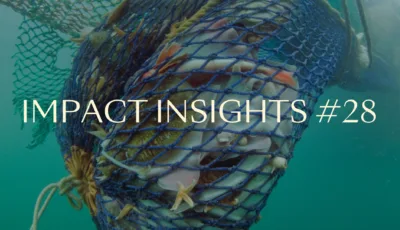Impact Insights #12

Get ready for the latest news that defined the sustainability landscape the past month, brought to you by Norselab’s Impact Analyst, Inès van Tol.
■ 2023 broke the record for the hottest year ever witnessed; scientists agree we will reach 1.5°C before 2030
In 2015 in Paris, 196 countries committed to keeping the global average temperature to 1.5°C above pre-industrial levels. This is the threshold above which extreme weather events will be even more complex and costly to deal with than they already are today. However, scientists warn that we will likely reach 1.5°C sometime in 2024. In 2023, the average temperature of 14.98°C was 0.17 degrees higher than in 2016 which held the previous record for the hottest year. According to a recent survey from the World Economic Forum, extreme weather is identified by the public as the risk with the highest likelihood to present a crisis on a global scale this year.
■ The EU parliament voted to halt unsubstantiated and misleading environmental claims
After months of negotiations, the EU Parliament approved in January the Directive on Empowering Consumers for the Green Transition, which aims to prevent companies from marketing their products and services using general and unverified claims - such as “green,” “ecological,” “biodegradable” or “eco-friendly.” Such claims will only be allowed when supported by labels and certifications recognized by the EU, such as the EU Ecolabel. The directive intends to reduce greenwashing and increase consumers’ trust. The ECGT also prohibits the use of the terms “climate-neutral” or “climate-positive” based on a company’s involvement in carbon offsetting schemes. Some carbon offsetting projects have recently been scrutinized, such as cookstove projects overstating real-life climate benefits by 1000%. This new regulation will be enacted across the EU in 2026.
■ Lawsuits - Shell and ING in the eye of the “duty to care” storm
In 2021, the environmental organization Milieudefensie won a court case against the giant Shell. New documents dating back to the 1970s, 1980s, and 1990s have recently been uncovered, revealing that the company was long aware of the harm its products caused and already recognized the need to take a careful approach - and yet did not change its course. These documents will allow litigators to strengthen claims against Shell. However, the company is not the only one in the spotlight currently, as the same campaign group, Milieudefensie, has initiated legal action against ING and communicated demands regarding policies and targets. As Europe's eighth largest fossil fuel financier, ING is deemed to breach its “duty of care” obligation. These cases make it clear that fossil fuel companies and their financers are facing increasing climate litigation risks unless communicating a solid phasing-out plan. After Shell, ING losing the case would likely increase public confidence that such cases can be won and open the way for more.
■ New report estimated benefits of shifting to sustainable food systems to USD 10 trillion annually
The Food System Economics Commission recently presented a new pathway for our food systems. The report shows that existing production destroys more value than it creates, due to hidden medical and environmental costs of USD 15 trillion annually (10% of global GDP). For instance, the report highlights that undernutrition could affect 640 million people by 2050, with unhealthy diets leading to a 70% increase in obesity. The proposed Food System Transformation is valued between 5 and 10 trillion USD a year, well above the annual implementation costs of 500 billion USD (between 0.2% and 0.4% of global GDP per year). The report clearly outlines the opportunity; we could eradicate undernutrition, reduce premature deatchs, and help 400 million farm workers earn a sufficient income. The report details the priorities to guide local and national strategies moving forward.
■ 320 companies and financial institutions become early adopters of nature-related corporate reporting
The Taskforce on Nature-related Financial Disclosures (TNFD) published in September 2023 its final recommendations on how companies should manage and report on their nature-related risks. The TNFD recommendations align with the Global Biodiversity Framework goals, which target the restoration of 30% of degraded ecosystems and the protection of 30% of valuable terrestrial and marine habitats by 2030. As of January, 320 organizations have committed to making nature-related disclosures following the TNFD recommendations. Among these, the lion's share is located in Europe, Asia, and the Pacific - with 6% of commitments in North America. Norges Bank Investment Management, the world’s largest sovereign wealth fund, is one of these early TNFD adopters. This framework is an important step in developing systems to quantify an organization’s impact on nature and biodiversity, which have long been overlooked despite the valuable ecosystem services they provide - food, water, oxygen, and recreational spaces, among many others.
■ Biochar could serve the dual purpose of cost-efficient carbon storage and soil fertilizer
A new action plan from the CIP Foundation has placed biochar as a promising method to store carbon stably and durably. Biochar is a solid product derived from heating agricultural residues to very high temperatures in a low-oxygen environment; the carbon initially stored in the biomass is transferred in equal parts in gases and biochar. This would be a less costly alternative to other Carbon Capture Storage (CCS) solutions which are at least twice as costly for society. The production and use of biochar come with multiple benefits. First, the capture of CO2 in biochar in a controlled environment prevents the release of CO2 in the fields by the decay of agricultural residues. Second, the process produces gas and bio-oils that can be used as green fuels, and surplus heat ready to be used. Finally, distributing biochar on soil greatly enriches it and increases its capacity to retain water. In fact, this soil fertilizing method goes back more than 2,500 years ago in the Amazon region. This comes as a positive development, particularly as a shift towards more sustainable food systems has been estimated in a recent study to result in USD 10 trillion of benefits annually.


